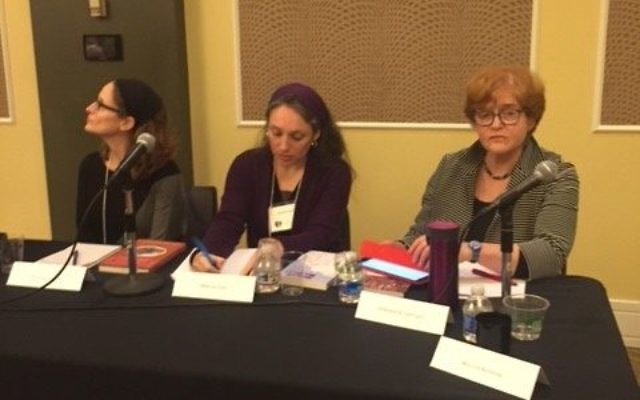Scholarship, Busted Myths Celebrate Tam Institute

By Arlene Appelrouth / aappelrouth@atljewishtimes.com
The Tam Institute for Jewish Studies celebrated 40 years of Jewish studies at Emory University on Sunday, Dec. 4, by highlighting some of the best of its scholarship for a crowd of about 100 people at Cox Hall.
Rabbi David Blumenthal, whose hiring from Brown University in 1976 launched the Jewish studies department at Emory, has remained a respected expert on Jewish mysticism and recently published a book titled “Keeping G-d at the Center: Contemplating and Using the Prayerbook.”
“It’s OK to be angry with G-d,” he said, explaining his perspective on Judaism is that “spirituality is at the core.”
Another professor, Rabbi Don Seeman, spoke about the relationship between anthropology and Judaism. He called the Chabad movement “neighborhood mystics” and said he has researched how Jewish tradition is understood by Chabad and various other Jewish groups.
Both spoke during a panel discussion on the anthropology and theology of Judaism, which was concurrent with a discussion on America and Israel as modern centers of Jewish life.
Eric Goldstein, the Tam Institute’s director and a specialist on Eastern European Judaism, spent his presentation time busting myths about Jewish immigration to the United States in the 20th century:
- Many people believe that the Jews who left Europe were the poorest and least educated, “but the facts are that between 1880 and 1914, Jewish immigrants from the Russian Empire were the most skilled and more literate than the Russian Jewish population as a whole.”
- Another myth is that many of our ancestors left to escape pogroms. “The fact is,” Goldstein said, “only a small minority suffered.”
- Many of today’s Jews, with Anglicized names, believe that their family names were changed at Ellis Island. But Goldstein said no immigration official at Ellis had the ability or power to change anyone’s name. Instead, “immigrants changed their own names.”
For example, he said a Jewish immigrant who ended up with the name Shawn Fergessen hadn’t intended that to be his name.
“When asked by the immigration officer what he was called, he answered shayn fergessen, which is Yiddish and means I already forgot,” Goldstein said. “His desire to forget stayed with him, as his name, for the rest of his life.”
The second session of panel discussions offered a choice between “Jews Across Time and Space” and “The Jewish Experience in Literature and Art.”
Rabbi Michael Berger, on the panel dealing with Jews across time and space, spoke about Judaism in its current state of “post-denominationalism.” He said religious practices are declining in Israel, Conservative Judaism is on the decline in the United States, and the number of U.S. Jews who are Haredi is up.
Rabbi Berger, who is working on a book called “The Intentional Jew,” said today’s religious scene is affected by the divorce rate and technology. He said there is a lack of religious stability.
Three Emory professors talked about their recently published books: Deborah Lipstadt, “Holocaust: An American Understanding”; Ellie Schainker, “Confessions of the Shtetl: Converts From Judaism in Imperial Russia, 1817-1906”; and Miriam Udel, “Never Better: The Modern Jewish Picaresque.”
Dentist Perry Brickman, who attended with his wife, Shirley, and about 100 others, called the afternoon program “first rate.”




comments